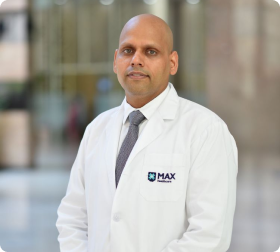Gastric Bypass Surgery
Gastric bypass surgery is a weight loss surgery that helps individuals with obesity lose weight and improve their overall health. It involves creating a small pouch from the stomach and rerouting a portion of the small intestine to this pouch, limiting the amount of food the stomach can hold and the absorption of calories. This procedure is commonly used for individuals who have not had success with other weight loss methods and are struggling with obesity-related health conditions.
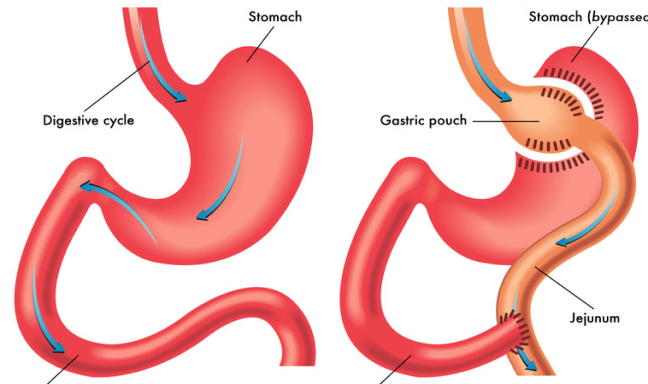
Types of Gastric Bypass Surgery
-
Description: The most common type of gastric bypass surgery. It involves creating a small stomach pouch and attaching it directly to the small intestine, bypassing a portion of the stomach and small intestine. This helps with both food restriction and nutrient absorption reduction.
-
Benefits: Significant weight loss, improvement in obesity-related health conditions like type 2 diabetes, and long-term success.
-
Description: A variation of the traditional bypass, where the stomach is divided into two parts, with the smaller upper portion being directly connected to the small intestine. It's quicker and has fewer complications compared to Roux-en-Y.
-
Benefits: Shorter surgery time, fewer complications, and generally quicker recovery.
-
Description: A more complex surgery that involves both the creation of a small stomach pouch and rerouting of a large portion of the small intestine. This surgery is effective for more significant weight loss, but it can be associated with higher risks.
-
Benefits: Greater weight loss potential, especially for people with morbid obesity.
1. Roux-en-Y Gastric Bypass (RYGB)
2. Mini-Gastric Bypass (One Anastomosis Gastric Bypass)
3. Biliopancreatic Diversion with Duodenal Switch (BPD/DS)
Gastric bypass surgery is typically recommended for individuals who are severely obese and have struggled with other weight loss methods. The candidates generally meet the following criteria:
Who Needs Gastric Bypass Surgery?
Gastric bypass surgery is typically recommended for individuals who are severely obese and have struggled with other weight loss methods. The candidates generally meet the following criteria:
-
BMI (Body Mass Index) of 40 or higher, or a BMI of 35 with obesity-related health conditions like type 2 diabetes, heart disease, or sleep apnea.
-
Failure to lose weight through diet and exercise.
-
No medical or psychological conditions that would interfere with the surgery or recovery process.
-
Commitment to long-term lifestyle changes, including healthy eating and regular physical activity.
Investigations Required
-
Physical Examination: To assess overall health and check for any contraindications for surgery.
-
Blood Tests: To check for conditions such as anemia, liver disease, or kidney function.
-
Endoscopy: To inspect the stomach and digestive system for abnormalities.
-
Chest X-ray: To ensure the lungs are healthy and clear for surgery.
-
EKG/ECG: To assess heart function, especially if the patient has a history of heart disease.
-
Psychological Evaluation: To assess the patient's readiness for long-term lifestyle changes after surgery.
-
Nutritional Assessment: To ensure that the patient will be able to follow post-operative dietary recommendations.
Procedure: How Gastric Bypass Surgery is Done
-
The surgery begins with a full pre-operative assessment. Patients are given general anesthesia to ensure they remain asleep during the procedure.
-
Roux-en-Y Gastric Bypass: The surgeon creates a small stomach pouch and divides the small intestine. The upper part of the small intestine is then connected to the pouch, bypassing the larger part of the stomach and the first section of the small intestine.
-
Mini-Gastric Bypass: The surgeon creates a small pouch and connects it directly to the small intestine, bypassing most of the stomach.
-
Biliopancreatic Diversion with Duodenal Switch: The stomach is reduced in size, and a significant portion of the small intestine is bypassed.
-
The incisions are closed, and the patient is taken to the recovery room. The surgery usually takes between 1-3 hours, depending on the type of bypass.
1. Preparation
2. Surgical Technique
3. Closing the Incisions
Length of Stay in Hospital
The length of hospital stay for gastric bypass surgery can vary, but here are general guidelines:
-
Initial Hospital Stay: Typically, 2 to 3 days post-surgery. During this time, the patient will be closely monitored to ensure there are no complications.
-
Recovery Period: The patient will gradually start consuming liquids and soft foods. Physical activity should be limited, and the patient will be monitored for any signs of infection or complications.
-
Discharge Criteria: The patient will be discharged once they can consume liquids comfortably, manage pain with oral medications, and have no signs of complications.
Post-Operative Care
Post-operative care is crucial for the success of the surgery and ensuring long-term weight loss and health improvement:
-
Dietary Changes: A gradual transition to solid food will be required, starting with clear liquids, progressing to pureed foods, and finally solid foods. Patients must follow a strict, low-calorie, high-protein diet.
-
Vitamin and Mineral Supplements: Since the surgery bypasses parts of the digestive system, patients may need lifelong vitamin and mineral supplementation, including iron, calcium, and vitamin B12.
-
Physical Activity: Light physical activity, such as walking, can be resumed shortly after surgery. Exercise will gradually increase as healing progresses.
-
Regular Follow-Ups: The patient will need regular follow-up appointments with the surgical team to monitor weight loss progress, check nutritional status, and adjust any supplementation needs.
-
Psychological Support: Emotional and psychological support may be necessary as the patient adjusts to their new lifestyle and eating habits.
Risks of Gastric Bypass Surgery
Like any major surgery, gastric bypass carries some risks. These include:
-
Infection: At the incision site or internal organs.
-
Bleeding: Internal or external..
-
Leaks in the New Stomach Pouch or Intestinal Connections: These can lead to infections or other serious complications.
-
Blood Clots: Potential risk, especially for patients with obesity.
-
Nutritional Deficiencies: Due to reduced food intake and altered absorption, patients may develop deficiencies in vitamins and minerals.
-
Dumping Syndrome: A condition where food moves too quickly from the stomach to the small intestine, causing nausea, vomiting, and dizziness.
Success Rate of Gastric Bypass Surgery
Gastric bypass surgery has a high success rate when performed on appropriate candidates:
-
General Success Rate: Around 80-90% of patients experience significant weight loss (50-70% of excess weight) within the first 1-2 years after surgery.
-
Improvement in Health Conditions: Many patients see improvement or complete resolution of obesity-related conditions such as type 2 diabetes, sleep apnea, high blood pressure, and joint pain.
-
Long-Term Success: With lifestyle changes, including diet and exercise, patients can maintain their weight loss over the long term. However, about 10-20% of patients may experience some weight regain over time.
Cost of Gastric Bypass Surgery
The cost of gastric bypass surgery can vary significantly depending on the country, type of surgery, and hospital. Below is an estimated cost table:
| Treatment | Cost Start From($) | Hospital Stay |
|---|---|---|
| Gastric Bypass | 5,500 onwards | 2 - 3 Days |
At Universelle Medicaid , we partner with leading hospitals and surgeons to provide you with top-quality gastric bypass surgery options at affordable prices. Let us help you take the first step toward a healthier, more active life.
TREATMENTS
Obesity Or Bariatric Treatment

Gastric Bypass Surgery
Bladder cancer occurs when abnormal cells grow uncontrollably...
More Information
Gastric Banding Surgery
Gastric banding surgery, also known as laparoscopic adjustable gastric banding (LAGB), is a popular weight loss procedure
More Information
Gastric Sleeve Surgery
Gastric sleeve surgery, also known as sleeve gastrectomy, is a popular weight loss surgery in
More Information
Gastric Bypass Surgery
Bladder cancer occurs when abnormal cells grow uncontrollably...
More Information
Gastric Banding Surgery
Gastric banding surgery, also known as laparoscopic adjustable gastric banding (LAGB), is a popular weight loss procedure
More Information
Gastric Sleeve Surgery
Gastric sleeve surgery, also known as sleeve gastrectomy, is a popular weight loss surgery in
More InformationDoctors
Our Specialist Doctors

Dr. Shashank Chaudhary
Surgical Oncology, Cancer Care


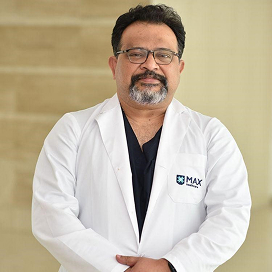
Dr. Vijayant Devenraj
Cardiac Surgery (CTVS), Thoracic


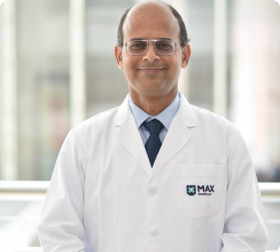
Dr. PrasoonKant Shamshery
Orthopaedics & Joint Replacement


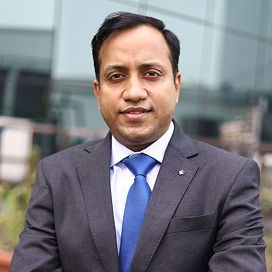
Dr. Vikas Singla
Senior Director & Head – Gastroenterology (Pancreatic-Biliary, Luminal Gastroenterology & Endoscopy Division)


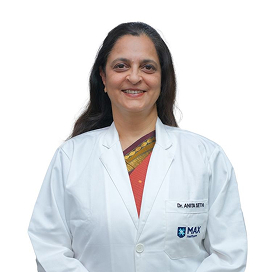
Dr. Anita Sethi
Principal Director & HOD - Ophthalmology (Max Panchsheel & Max Saket)


Book Appointment
Complete the form below to schedule your appointment.
Begin Your Health Treatment Journey with Us
By utilizing our services, you'll find it easier to improve your well-being and feel better.
Consult Now


